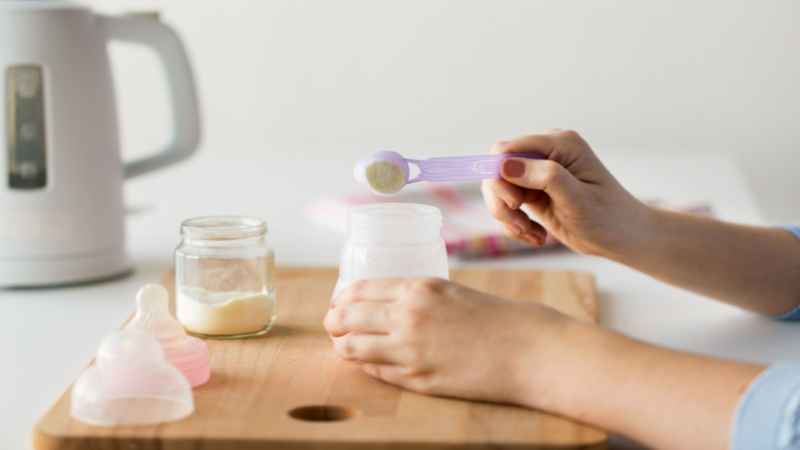
After going through labor and delivery, the next step for new mothers is adjusting to breastfeeding. Concerning our traditional and cultural values, most of us do not step away from breastfeeding unless we have any medical conditions that may not allow it. But with changing times and preferences of people, career/work, and determination to get back to the pre-pregnancy figure, mothers are moving to powdered milk as a substitute for breastfeeding. Let’s understand Formula Milk For Babies – Benefits, Risks And Precautions.
Also, females who opt for infertility treatments or c-section delivery have been shown to opt for formula feeds. Depending on the requirement of the baby different formula feeds are available in the market. For babies allergic to milk, formula feed becomes the best resort to maintain the calorie and nutritional requirements. Read on to learn more about powdered milk for babies. (1)
[joli-tok]
What is Formula or Powdered Milk?
Essentially, powdered milk or formula is a nutritional substitute for breast milk. Usually, cow milk is processed to make it infant-friendly by adding good gut-friendly bacteria to support digestion. This formula focuses on providing essential nutrients required by the baby for proper growth and development.
How is Formula Milk Prepared?
Powdered milk also known as dried milk is made by vaporizing the liquid content, leaving behind dry powder. Commercial formula milk is a complex combination of cow’s milk, goat’s milk, probiotics, and probiotics, DHA and AHA. Additionally, fat-soluble vitamins like Vitamin A, D, E, and K along with water-soluble vitamins like B complex, and vitamin C are added to ensure proper nutrition.
When to Introduce Formula Milk to Babies?

Introducing formula feeds depends on the mother. In the case of exclusive breastfeeding, formula feeds are advised to post 6 months as the mother’s feed is enough to provide essential nutrients. However, when a mother faces a challenge like lactational amenorrhea or the baby is allergic, formula feeds can be introduced as advised by a doctor or lactational expert.
In the first week, it’s usually 30 ml-60 ml for the 1st week after birth, and goes up to 90 ml-120 ml in 3-4 weeks. By the end of 4th week, the baby can easily take up to 120 ml twice to thrice a day. (2)
When it comes to allergy to lactose, which is the sugar in milk, powdered milk becomes the right choice.
Various types of formulas can be introduced apart from cow milk-based formula (3)
Types of formula milk (4)
| Type of Formula | Composition and Use |
|---|---|
| Standard or cow’s milk based formula |
|
| Soy-based formula |
|
| Protein hydrolysates or hypoallergenic formula |
|
| Amino acid formula |
|
Benefits of Giving Formula Milk
Mothers who cannot breastfeed resort to feeding their babies with formula milk. Though the formula has many nutrients that a growing baby requires, it lacks the important antibodies that breast milk provides to the baby to fight infections and grow.
Feeding formula milk means the mother can get more rest and the other members of the family can also participate in the growth and nurturing of the baby. But it is expensive and can be a financial constraint on the parents.
Benefits of Powdered Milk For Babies

Infant formula nowadays comes packed with minerals and is the next best alternative to mother’s milk. Though exclusively breastfeeding your baby is the best, especially during the first six months of life, the formula comes in handy when the mother is not able to breastfeed. But remember, infant formula can never replicate the mother’s milk in totality.
1. Excellent Source of Vital Nutrients
Infant formulas are rich in iron, calcium, and vitamins, which in the case of breast milk depend on the dietary intake of the mother. This helps combat anemia in babies. This way, the baby’s dependence on the mother’s diet is reduced for nutritional needs.
2. Makes Feeding Convenient
Some mothers may find it difficult to breastfeed their babies, especially when traveling. In such cases, formula milk becomes an easy and convenient way of feeding babies. It saves mothers the process of pumping and storing breast milk for emergencies or when they can’t feed their little ones.
3. Feeding is No More Only the Mother’s Chore
Yes, you can pump and store breast milk. But what if you are sick, or out of town? Formula milk is easy to prepare and anyone can feed the baby.
4. Makes weaning easier
Introducing formula to breast milk in the early months can facilitate easier weaning from breast milk. However, this process should occur under the guidance of a healthcare professional.
5. Minimizes Restrictions to the New Mother
The nutrients from food eaten by mothers pass on to the baby through breast milk. For this reason, mothers have to exercise caution in their dietary intake. For instance, caffeine/alcohol intake or herbal teas must be regulated. Powdered milk releases the new mum from such restrictions.
6. Can be Measured
In cases where an infant is suffering from some disease and the mother needs to monitor the feeds, formula milk becomes helpful.
7. Feeding Frequency
Formula milk is not easily digestible, hence the baby feels full for longer times. This means mothers get more time in between feedings as feeding frequency is less.
[Read: Storing Formula Milk]
Are There Any Risks Associated With Feeding Formula Milk?

Apart from being the second choice to breastfeeding, powdered milk does have quite a few disadvantages as well, as listed below:
1. Expensive
Breast milk is free, but you have to buy infant formula. They are available from various brands and ages, so choosing them could be difficult too. Additional expenses are borne towards bottles and nipple expenses.
Also, you will need to buy and store large quantities of good-quality formula to match the ever-increasing requirements of your growing baby. The formula also comes with expiry dates, so you may need to throw away old jars and be cautious when feeding.
2. It Requires More Efforts
The process of preparing the milk – warming water, mixing, transferring to bottle, etc. takes time and effort. For preparing the formula, you will need hot water. But when feeding your baby, you must make sure that the formula milk is at the right temperature.
In terms of sterilizing the bottles and nipples as well as keeping them ready for the next feed. Breast milk, on the other hand, is always at the right temperature and you can directly feed without much thought.
[Read: How To Sterilize Baby Bottles?]
3. Devoid of Essential Antibodies and Growth Hormones
Mother’s milk contains many key components that formula milk may not have. While powdered milk may have its own advantages, the baby will be devoid of certain essential nutrients. (3)
4. Difficult to Digest
Breast milk is tailor-made for a baby and is very easy to digest. However, digestion can be a problem when it comes to formula milk. This may cause your little one an upset stomach or conditions such as constipation and gas in the baby.
5. May Hamper Mom and Baby Bonding
Breastfeeding is a very special experience and activity, both for the mum and the baby. The baby sucking on your breast with occasional eye contact and your touch is what connects you to the baby.
[Read: Combining Bottle And Breastfeeding For The Baby]
Precautions to Take When Feeding Powdered Milk to Babies

Though formula feeding seems easy however there are a few things that should be kept in mind while purchasing, storing, and preparing feeds for infants. Along with formula milk comes bottles.
Here are a few points to always keep in mind:
- Study and compare different brands offering formula milk.
- Check the manufacturing and expiry date.
- Read the nutritional labels carefully with any organic or fortification logo.
- Avoid formula feeds with added sugar as it directly impacts the cognitive development of the infant.
- Once the purchase is done, make sure to keep it in a dark area in an airtight container.
- Follow the instructions mentioned on the back of the packet or expert advice for dosage.
- Sanitization of the hands, counter, and bottles should be carefully done to avoid any pathogens.
- Mix the formula in lukewarm water as per the directions on the packet.
- The use of BPA-free or glass bottles is advised to prevent any health hazards due to low-quality plastic.
- Heating formula milk in the microwave should be strictly avoided as it can create ulcers in the mouth.
When to Consult a Doctor?

It is always advised to consult a doctor when a baby experiences rashes, redness on the face or whole body, severe diarrhea or constipation after the consumption.
It’s totally a mother’s choice whether and when to introduce powdered milk. Unlike, in cases of lactose allergy, lactational amenorrhea, or cleft lip of baby. There are multiple pros and cons to powdered milk. The hygiene factor plays a vital role. It’s the nearest alternative to the mother’s feed. It’s always advised to check with a doctor to know which powder to start.
FAQ’S
1. What is The difference Between Powdered Milk, Formula Milk, And Infant Formula?
There is no difference between powdered, formula, and infant milk. These are the alternate names used in the market.
2. At What Age Can I Start Formula Milk for My Baby?
Formula feeding can be introduced from the 2nd month itself. The portion is to be followed as advised by the lactational expert.
3. How Long Can Formula Feed to Stored in the Refrigerator?
The formula can be kept in the refrigerator for up to 48 hours. However, its advised to prepare fresh formula before feeding the baby.
Reference
- Amy J Hobbs, Johns Hopkins Bloomberg School of Public Health | JHSPH · Department of Population, Family and Reproductive Health RN, MSc, Cynthia Mannion BA. MSc(A). PhD, RN, Sheila Mcdonald; University of Calgary Meredith Brockway; University of Manitoba –https://www.researchgate.net/publication/301666570
- American Academy of Pediatrics – https://www.healthychildren.org/English/ages-stages/baby/formula-feeding/Pages/amount-and-schedule-of-formula-feedings.aspx#
- Trista Briggs Dietetics Student; Mateja R. Savoie-Roskos PhD, MPH, RD; Lydia Bangerter Dietetics Student; Casey Coombs MS, RD – https://extension.usu.edu/nutrition/research/breastfeeding-or-formula-feeding-a-mothers-choice#
- NHS, Types of formula – https://www.nhs.uk/conditions/baby/breastfeeding-and-bottle-feeding/bottle-feeding/types-of-formula/#

